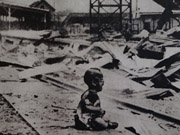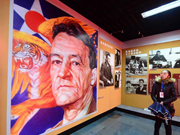The Chennault Aviation and Military Museum, not far from the airport of Monroe, Louisiana, is a plain building at the first sight. However, it used to be the site of the Selman Field Army-Air Force Navigation School, which was the largest such facility in the US, offering the nation's only complete navigation course during the WWII and over 15,000 navigators graduated from here.
"My grandfather loved China. His heart never left China"
In front of the main entrance of the museum stands the statue of Lieutenant General Claire Lee Chennault. On the red brick wall behind the statue, Chennault's story in China is inscribed in both Chinese and English. During WWII, an American volunteer air force group, coming all the way from the other side of Pacific, joined in the war against the Japanese army in the China-Burma-India Theater, and achieved great success in the war against Japan. This air force, called by Chinese people as the "Flying Tigers", was commanded by Claire Lee Chennault.
Nell Chennault Calloway, granddaughter of Gen. Chennault and director of the museum, told the People's Daily, "After retirement, my grandfather lived in Monroe all the time. My mother founded this museum in 2000." She added: "My grandfather loved China. His heart never left China."
In the museum, a piece of cloth with the words "American air force comes to China to fight Japanese enemies with us, please help and rescue them the same way you treat Chinese soldiers" was the protective talisman of the members of the "Flying Tigers". And the wreckage of a B-29 bomber found in southeast China's Chengdu is a symbol of their sacrifice.
"The 'Flying Tigers' is part of China's Anti-Japanese history", said Calloway. "Gen. Chennault knew about the Nanking Massacre and he provided medicines and other aids within his power," she emphasized. "My favorite motto is 'those who forget the past have no future', and those who deny the past have no future either. Our museum is trying to let Americans know the sufferings of Chinese people during WWII and the history of our two countries fighting shoulder to shoulder. We shall make the voice louder to drown out the voice that denies the history."
Calloway said that she and her coworkers were planning to expand the museum. Elvis Stout, President of the Chennault Museum Endowment Board, said that some people denied the historical facts including the Nanking Massacre, so the new museum would help people remember the history and Chinese people's misery during WWII.
Wendell Rogers, CEO of Chennault Museum Endowment Board, told the reporter that the new museum would show Chinese history from 1937 to 1945 in annals. The Nanking Massacre in 1937 will be important historical facts for the public to know. “The war in China was an undeniable fact. Some Japanese politicians want to distort the history, but the history will eventually come out in the wash.”
"To tell the history is my mission now"
Former "Flying Tigers" member Richard W. Sherman, 92, and President of China-Burma-India Hump Pilots Association J. V. "Jay" Vinyard, 90, received an interview in the museum.
Sherman had fought in China for 13 months with his B-25 bomber. In wheel chair now, he wore the flight suit of the "Flying Tigers" on purpose. He said: "I saw and heard the atrocities Japanese army committed in China and Chinese people's sufferings at the time." He was very angry about Japanese government's wrongdoings. "The truth is so obvious. We knew how China was invaded, and that's why we came to China to help Chinese people." As the cofounder of the museum, Sherman said: "I am here to pass on WWII history. People like me must shout loudly. To tell the history is my mission now."
J. V. "Jay" Vinyard has a legendary experience of flying the Hump 87 times in his C-46 transport plane. He said: "Japan must admit their crimes committed in Nanking in 1937 and how they abused and oppressed Chinese people during WWII. The younger generation deserves to know the truth. Denial of the history is Japanese politicians' trick. They denied because they did not want to face up to the history. This is very dangerous. Without a serious attitude towards history, Japan may make bigger mistakes and eventually eat its own bitter fruit."
The article is edited and translated from《否認歷史的人沒有未來》, source: People's Daily, author: Wen Xian.
 |

 800-year-old ancient village in Shanxi
800-year-old ancient village in Shanxi A glimpse of China's Zhongshan station in Antarctica
A glimpse of China's Zhongshan station in Antarctica Female marines receive tactical training in NW China
Female marines receive tactical training in NW China Shanghai women fall in love with Aerial Yoga
Shanghai women fall in love with Aerial Yoga This is Beijing – Nanluoguxiang
This is Beijing – Nanluoguxiang Old photos of Anti-Japanese War (1937-1945)
Old photos of Anti-Japanese War (1937-1945) Top 10 cities for falling house prices in January
Top 10 cities for falling house prices in January Top 10 richest real estate tycoons: Hurun
Top 10 richest real estate tycoons: Hurun Large numbers of ancient coins excavated in Inner Mongolia
Large numbers of ancient coins excavated in Inner Mongolia British WWII veteran: I can't forgive Japan
British WWII veteran: I can't forgive Japan Top 10 brands that win rich women's hearts
Top 10 brands that win rich women's hearts Memorizing the Flying Tigers
Memorizing the Flying Tigers The Chinese Dream: the Chinese Spirit and the Chinese Way
The Chinese Dream: the Chinese Spirit and the Chinese Way
Day|Week|Month